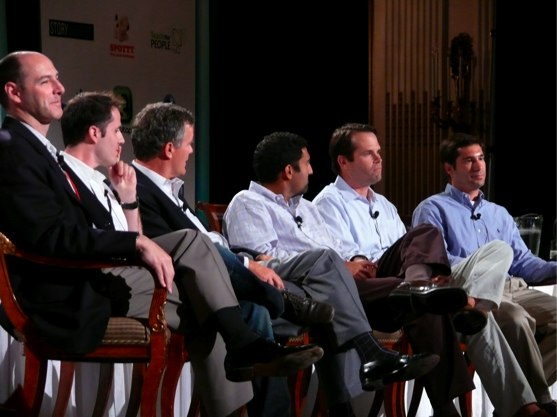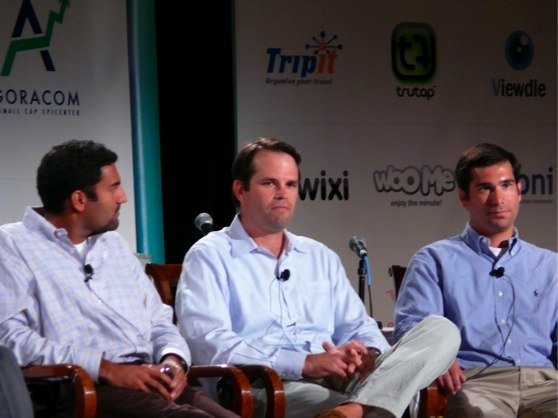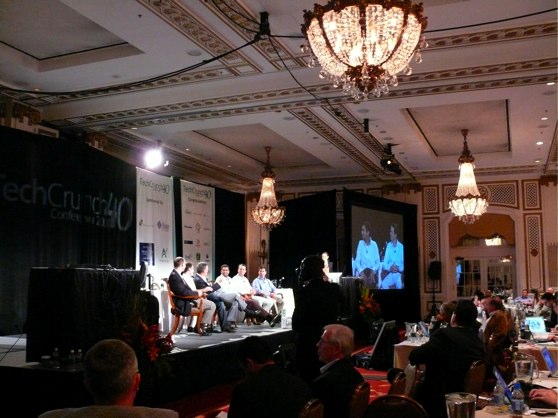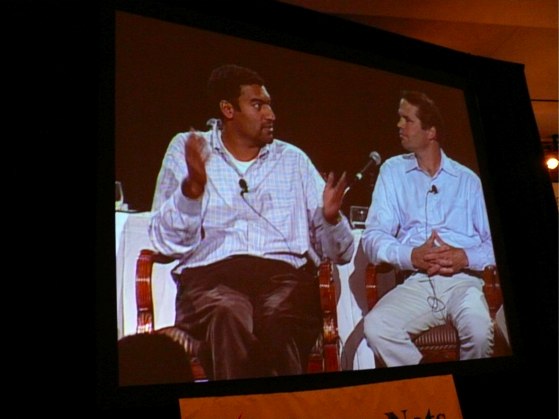After this mornings panel focused on getting funded, the last panel discussion for TC40 focuses on the other end of the startup cycle: exit strategies. TechCrunch’s Heather Harde is moderating and is joined by Michael Montgomery (Montgomery & Co.), Craig Walker (GrandCentral/Google), Raj Kapoor (Mayfield), Ted Wang (Fenwick), Michael Marquez (CBS) and Evan Williams (Obvious and Twitter).
Q: best way to sell your company for a large amount of cash. A: MM: first have a real company. Second, being able to show profits, even current or future…revenue model is a must, and will make acquisition companies take notice.

Q: Should you think about exit strategies A: RK: yes, you should definitely think of an exit strategy. Are you building a platform company for the long term or taking VC…if taking VC they’ll want an exit.
Q: how to deal with it. A: TW you want to try and avoiding having to flip if the investors weren’t planning of that.
Best way to get acquired from GrandCentral founder: don’t try and get acquired! :-)

Evan Williams talks about his experience with Blogger, was approaches, didn’t try an make an auction.
TW: for making acquisitions, they look at whether the target will help them in their corporate strategy
Talk about mistakes of the past, bankers sometimes are too expensive. Challenge in M&A is preperation, coaching, it’s art not a science, you need to get ahead of the game.
Q: how long do you partner with companies prior to the process, to Michael Montgomery (banker). A: can be a long process, even as long as 1-2 years, bankers put the company name out there so that if an offer comes, you can end up with multiple bidders.
TW: be prepared, bankers help the process, makes things go more smoothly.

Q: how does CBS deal with it A: MM playing in the ecosystem, going to companies, we are not big and scary and not stealing ideas.
Q: how do you valuations. A: CW: a pre-revenue company is difficult to price, and no metrics to use. Compares to comporable companies in the space…but a little bit of picking a number from no where…will they pay? EW: was difficult for us with Blogger as both Google and Blogger were private. Smaller deals are different to big deals, if you’re small let the acquirer come up with the figure.
M.Montgomery doesn’t like earn-outs. Club Pengiun deal was both parties agreeing, but this isn’t always the case. Gives other examples, it can work, other times it doesn’t, but start with no as the first choice. Risk involved as well.
Q: how do you “incent” people when they believe they are worth more than they are? A: point where you move from valued on users to valued on revenue, the metrics are different between the two.

Q: what are the complications with a cross border deal like Last.fm A: part of the deal with Last.fm was increasing the overseas exposure in terms of investment, so it was a good thing. You do need to think it through though.
Q: How did Greg go with GrandCentral and moving to Google A: it’s certainly different. We liked the deal not just because of the money, but also because it was Google, a cool place to work. You’ve got to find a company and role if you want one…sometimes there isn’t.
Q: how did Evan find it. A: most startup founders don’t stick around. The hope is that they will be happy for a couple of years, add to the company and build the vision.
TW: the acqusition process is the first step into the new company, you need to consider it as the first day on a new job…M&A’s can be nasty over the details, you need to try hard to keep it civil.
talk about the best price, MM says that a banker there are times he tells his clients to stop being stupid and take the offer, end of the day if it’s a good deal don’t get too greedy.

Advice: begin with the end in mind, don’t obsess about it.
EW: be patient, it will coming looking for you
MM: have good representation, particularly in terms of lawyers. You may need to change law firms, many don’t have M&A experienced.
RK: If they think you’ll walk away, you wont get a good deal.
have a good relationship with your investors
Audience questions: In the current M&A market 50-100 million, what are the key trends in the deals, and timeframe MM: 4-6 months on M&A, trends its hard to answer, depends on product and company.
Q: how much emphasis is being put on the leadership of the company. A: specific to the company.